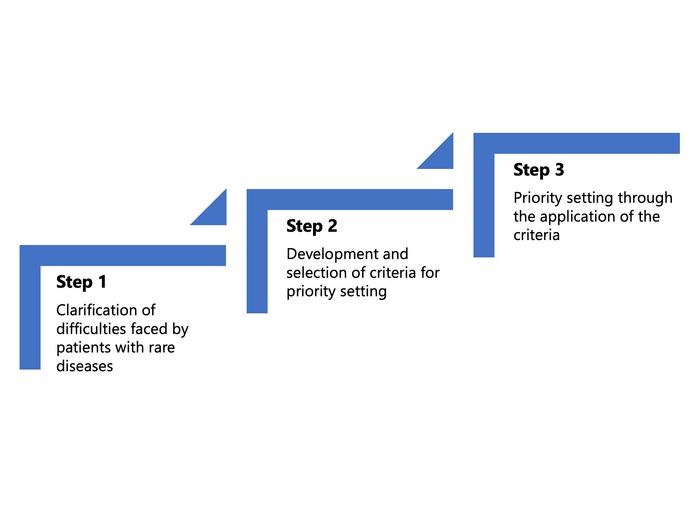Osaka, Japan – Patients with rare diseases have traditionally been the subjects of medical research. However, in recent years, their role has begun to shift from ‘research participants’ to ‘experts with a lived experience’, with some being involved in study planning, design and interpretation. Additionally they may soon be involved in helping pick the most important areas to prioritize for research.

Credit: 2023 Kogetsu et al., Enhancing evidence-informed policymaking in medicine and healthcare: stakeholder involvement in the Commons Project for rare diseases in Japan, Research Involvement and Engagement
Osaka, Japan – Patients with rare diseases have traditionally been the subjects of medical research. However, in recent years, their role has begun to shift from ‘research participants’ to ‘experts with a lived experience’, with some being involved in study planning, design and interpretation. Additionally they may soon be involved in helping pick the most important areas to prioritize for research.
In a study published last month in the journal Research Involvement and Engagement, researchers from Osaka University created an online space, referred to as the ‘Evidence-generating Commons’, for conversation, collaboration and knowledge sharing among patients with rare diseases, family members, researchers and former policymakers.
The researchers had two important goals: to generate evidence that could contribute to new policies in the field of rare diseases, and to explore ways that stakeholders could be involved in the process.
To do this, they designed a series of in-person and online workshops that focused on understanding the difficulties faced by patients with rare diseases and their families, deciding on criteria that could be used to set research priorities, and then setting research priorities by applying these criteria. The researchers were flexible in their process, allowing the discussion points to be modified as the workshops went along to make sure the opinions and ideas that emerged in previous meetings were captured.
“In the first stage, participants were given 10 minutes to brainstorm difficulties faced as well as solutions, before coming together as a group to discuss and organize these ideas,” explains lead author of the study Atsushi Kogetsu. “In the second and third stages, participants engaged in workshops on specific themes that had come up and worked together to build a set of research priorities.”
The ‘Commons’ was found to have a surprisingly positive impact on participants. “Everyone who participated in the project was able to grow and learn from each other, and several patients voiced their appreciation at having the opportunity to be part of the conversation and have their voices heard,” says Kazuto Kato, senior author.
The results showed that patients with rare diseases faced a wide range of issues including impacts on daily life, family problems and social issues. From an initial set of 228 sticky notes, the project members identified 33 core themes that could be organized into 10 categories. They also identified seven topics that were considered high priority, including financial burden, impacts on daily life, anxiety and the challenges of hospital visits. The achievements of the study were published in a research paper, for which several patients were co-authors.
Policymakers are increasingly aware that evidence comes from a variety of sources and that the unique perspectives of patients and their families is one such critical source. Yet there are still far too few examples of in-depth collaboration between patients and professionals. By bringing these voices together to create a set of research priorities, this study takes an important step toward more inclusive, collaborative and effective healthcare.
###
The article, “Enhancing evidence-informed policymaking in medicine and healthcare: stakeholder involvement in the Commons Project for rare diseases in Japan,” was published in Research Involvement and Engagement at DOI: 10.1186/s40900-023-00515-5.
About Osaka University
Osaka University was founded in 1931 as one of the seven imperial universities of Japan and is now one of Japan’s leading comprehensive universities with a broad disciplinary spectrum. This strength is coupled with a singular drive for innovation that extends throughout the scientific process, from fundamental research to the creation of applied technology with positive economic impacts. Its commitment to innovation has been recognized in Japan and around the world, being named Japan’s most innovative university in 2015 (Reuters 2015 Top 100) and one of the most innovative institutions in the world in 2017 (Innovative Universities and the Nature Index Innovation 2017). Now, Osaka University is leveraging its role as a Designated National University Corporation selected by the Ministry of Education, Culture, Sports, Science and Technology to contribute to innovation for human welfare, sustainable development of society, and social transformation.
Website: https://resou.osaka-u.ac.jp/e
Journal
Research Involvement and Engagement
DOI
10.1186/s40900-023-00515-5
Subject of Research
People
Article Title
Enhancing evidence-informed policymaking in medicine and healthcare: stakeholder involvement in the Commons Project for rare diseases in Japan
Article Publication Date
29-Nov-2023




